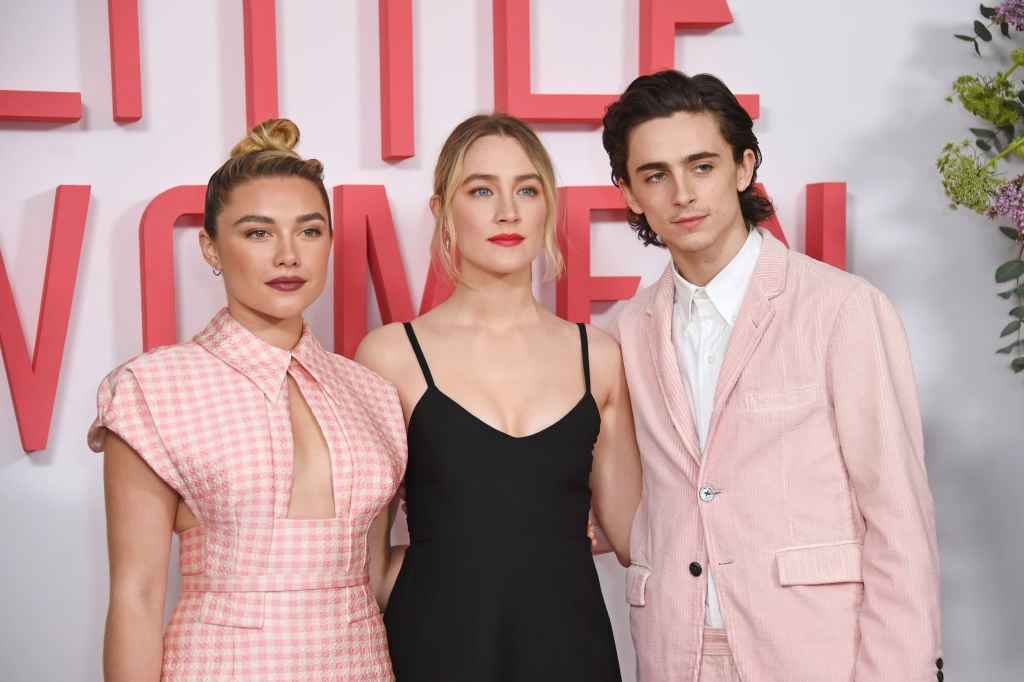‘Little Women’: Fans Are Torn Over This Love Triangle Thanks to Greta Gerwig’s New Adaption
Greta Gerwig’s adaption of Little Women premiered on Dec. 25, 2019. The newest version of the timeless classic stars Saoirse Ronan, Emma Watson, Florence Pugh, Eliza Scanlen, and Timothée Chalamet.
The movie is based on a novel by the same name that was written by Louisa May Alcott and published in 1868. Gerwig wrote the screenplay to adapt the book to the screen. Disclaimer, this article contains spoilers for Little Women.

The movie started discourse all over again on social media
After the movie’s premiere, fans of the book and movie posted their feelings about some of the romantic story lines on Twitter. Some fans were happy that Amy, played by Pugh, and Laurie, played by Chalamet, ended up together. Others were hurt over the fact Laurie and Jo, played by Ronan, seemed endgame. And finally, other fans recognized that Jo was never supposed to end up with anyone and that her love for Laurie was platonic.
“still thinking about amy and laurie and the absolute serve that was their relationship,” a fan tweeted.
“the fact that LAURIE kisses AMY FIRST means so much esp after she says she wont be a second choice. bc the kiss is him telling her she ISNT. thats when u kno its love bc he never kissed jo, and he wouldnt want to be rejected again but he took the leap w amy bc it was Real,” wrote a Twitter user.
“no one @ me but ppl who ship jo and laurie missed the whole point and clearly don’t see what is a completely platonic relationship amy and laurie remain superior,” one fan tweeted.
“jo and laurie’s ending is going to haunt me for months,” wrote a fan on Twitter.
Greta Gerwig changed Amy’s character in her ‘Little Women’ adaption
To adapt the novel to the screen, Gerwig changed some of the characterizations to fit with her vision of the movie. One of the characters Gerwig changed was Amy. While Amy was controversial in the novel, the writer and director made Amy more of an equal to Jo in her adaption.
“One of my experiences of reading the book was actually re-experiencing Amy as a profound character and equal to Jo, and someone that is a worthy opponent in some ways of Jo,” Gerwig said in an interview with Deadline.
She continued, “Another thing she said is, ‘The world is hard on ambitious girls.’ And the world is still hard on ambitious girls. And this is Amy speaking. To me it seems so obvious that she hadn’t been given her due in our collective consciousness.”
The director also changed Jo’s ending
Since the novel was published, some fans of Little Women have been baffled by the ending. Gerwig’s adaption provides a sort of alternate ending for fans. That alternate ending is centered around Jo.
On the DGA Podcast, Gerwig revealed that Alcott never married the way Jo said she never wanted to in Little Women. However, the author felt Jo needed to marry in order for the book to sell.
“… unlike Jo March who does get married and have children, Louisa May Alcott never got married and she never had children. But she was convinced that she needed to have Jo get married and have children in order to sell the book, but she never wanted that for her heroine. She wanted her to remain, as she called it, a literary spinster, but they convinced her no this is not gonna work so she did it the other way,” Gerwig said.
So in Gerwig’s adaption of Little Women, Jo is actually a combination of her character from the book and Alcott herself. At the end, instead of falling in love with Professor Bhaer like in the book, Jo pitches that idea to her publisher.
The final scene shows Jo surrounded by her family at the new school she opened, and Professor Bhaer is present. However, the ending is left ambiguous on if he is there as a teacher or Jo’s partner. Based on what Gerwig has said, it seems safe to assume Jo did not marry.
“Part of what I wanted to do was 150 years later give her an ending she might have liked,” Gerwig said of Alcott.


